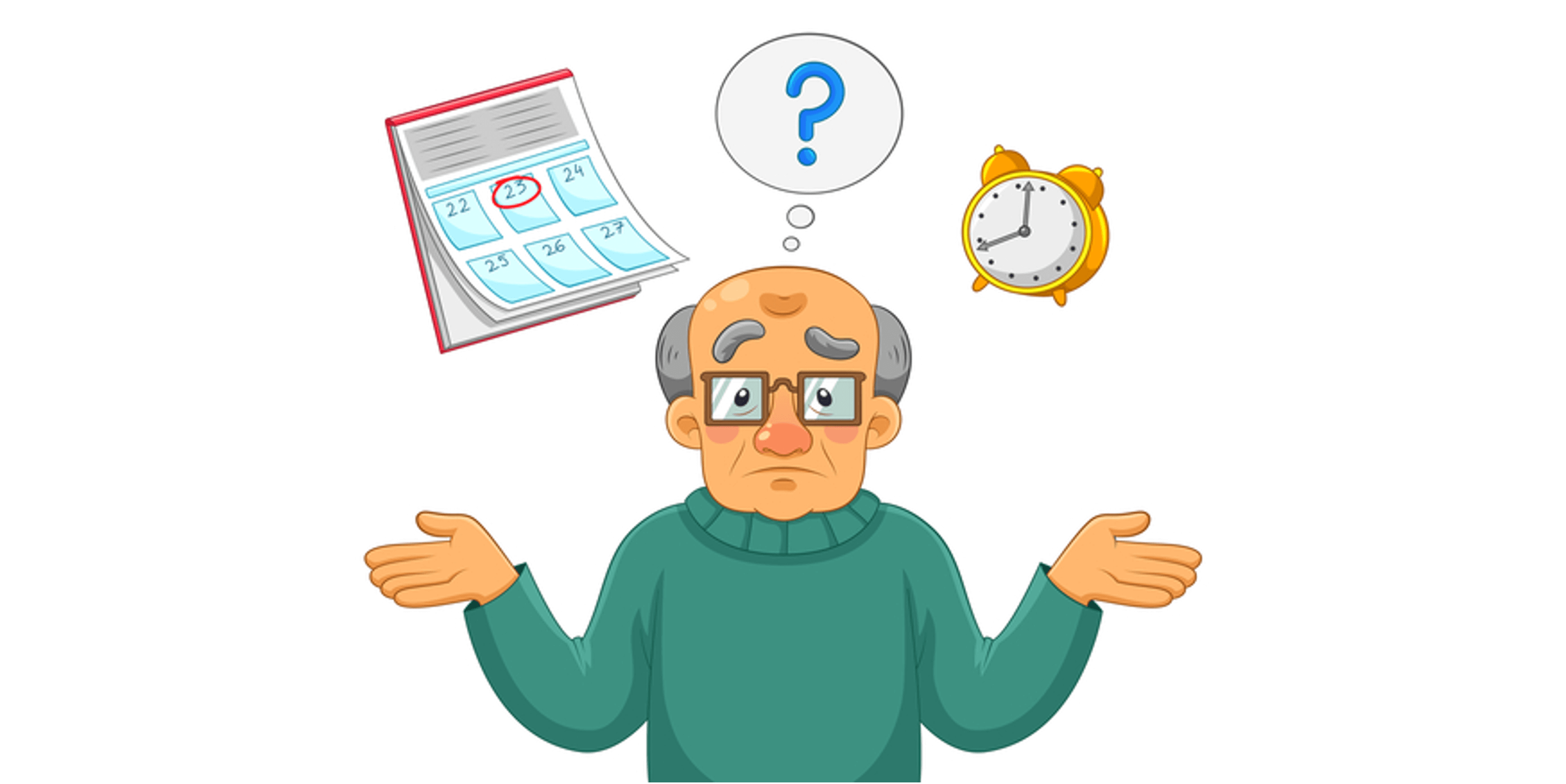
Page contents
One of the many things that people living with dementia can struggle with is the concept of time. This difficulty can manifest in many ways and can make day to day living more challenging.
Why can people with dementia struggle with perception of time?
The brain regulates time in two key ways – the ability to tell the time and plan accordingly, and the innate body clock. When the brain is damaged by dementia, the person can lose the reasoning and analytic abilities needed to tell the time and plan their day. Their natural circadian rhythms can also be off kilter, so they don’t instinctively know when it’s night or day, or what season it is.
Issues with memory also play a large role in why people with dementia lose track of time. Because they can’t remember events as recent as a few minutes ago, they don’t have perspective of when other events happened, or will happen, in comparison. It’s like trying to find directions on a map when you don’t know where you are to begin with, but with time.
In what ways can dementia affect time perception?
Knowing what time of day, month, year or season it is
Properly called spacio-temporal orientation, people living with dementia are often unsure of where they are in the day, month or year. It’s normal for anyone to take a moment to recall what the date is but they can work it out using memory and reasoning. People with dementia often cannot do this, and may exhibit behaviours like going to bed in the middle of the day or wearing a winter coat in July.
Understanding the passage of time
People with dementia can lose their sense of duration and ability to comprehend how much time has passed. They might think that you haven’t spoken to them for weeks, when you do so every day, while insisting that they went out with their friend yesterday when in fact it was months ago.
The speed of time doesn’t necessarily go at an even pace to someone with dementia. Just as we say ‘time flies when you’re having fun’, while other days drag, people with dementia can experience a very warped sense of time passing, but lack the ability to work out how much time has really passed.
Time management
As their problem-solving skills diminish, a person with dementia can find it very challenging to plan their time. It can be difficult for them to assess how long a task will take to do, and they can feel confused and overwhelmed if having to process and organise several pieces of information. They might arrive to social commitments a day early, or find journeys on public transport extremely stressful to organise.
Many people with dementia are aware of their difficulties. They might want to know what the time is constantly to ease anxiety, or lose confidence in their ability to manage their time and activities, particularly if they are unable to do as much as they used to.
Telling the time
Telling the time is a skill we learn as children but it takes a good amount of analytic ability to do so. People with dementia can lose the ability to analyse where the hands are on the clock face, understand the order of the numbers and correlate this information.
The Clock Test is used to assess or diagnose dementia. It involves a medical professional drawing a blank clock face then asking the person being tested to add the numbers and the hands. Very often, the person will write the numbers in the wrong order or even completely backwards, and they are unable to draw the clock hands to show any given time.
Time-shifting
Dementia makes it difficult for people to form new memories while they can remember events from decades ago as clearly as if they happened yesterday. You may notice your loved one increasingly talking about the past. This can be a sign of depression and may even lead to time-shifting.
Time-shifting is when a person with dementia believes they are in an earlier time in their life. For example, they might think it is the 1970s, get ready to go to an old job each morning, think someone has stolen their clothes or become distressed looking for their young children.
They may tell you they spoke to their (deceased) mother on the phone this morning, or not recognise their spouse because the only version of them that the person remembers is the one from fifty years ago.
What sort of age people time-shift to is variable, some can go back a few years while others can think they are a child and go looking for their parents.
How can I help someone with dementia with time perception?
While your loved one’s cognitive abilities are unlikely to improve, there are small ways you can help them to manage as best they can.
Get a dementia clock and/or watch
Dementia clocks vary but most tell the time, date and whether it’s morning or afternoon in digital or another easy to understand way. Having at least one of these in your loved one’s home can help them to feel grounded, particularly if they are suddenly overcome with confusion or wake up from a sleep not knowing where or when they are. Dementia watches can do the same, or say the time aloud.
You can buy dementia watches and clocks in various places online, including directly from the Alzheimer’s Society.
Help them to keep organised
Good organisation can minimise confusion about time and decrease anxiety. Help your loved one to manage their time with large-print calendars, wall charts or diaries that they can refer to as many times as they need.
Keep their environment seasonal
If your loved one struggles to know what time of year it is and how to dress for the weather, you could adjust their home to each season. This could include decorations and taking out-of-season clothes out of their wardrobe, such as putting their winter coat and gloves elsewhere in the summer to increase the likelihood of them dressing for the weather.
Support them to have a routine
Having a steady routine can help your loved one to differentiate between one day and the next, and feel more confident.
Make sure they know what to do if they cannot follow their usual routine. For example, if their usual train is cancelled, they may become panicked and confused. A particularly helpful tool is a dementia phone, so they can easily call you and other key contacts if they are lost or confused.


